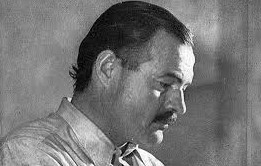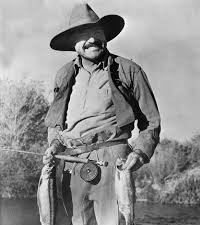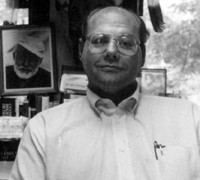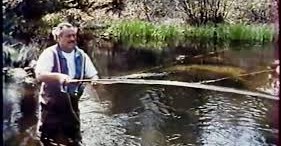It is utterly soothing to fly fish for trout. All other considerations or worries drift away and you couldn’t keep them close if you wanted. Perhaps it’s standing thigh deep in a river with the water passing at the exact but varying speed of life. You easily realize this mortality and it dissipates into the landscape.
— Jim Harrison
What did I know best that I had not written about and lost? What did I know about truly and care for most? There was no choice at all.
— Ernest Hemingway in A Moveable Feast about writing Big Two-Hearted River
I start the day by reading Hemingway on Fishing, a compilation of writing, both fiction and non-fiction, by Ernest Hemingway. It’s edited by Nick Lyons, who has done more for fly fishing literature than any single person in its long literary history. Being an armchair angler, I have welcomed Lyons into my pantheon of heroes.
My interest in the much maligned and misunderstood American writer has been rekindled this summer by Mary V. Dearborn’s excellent Ernest Hemingway: A Biography. Hemingway’s first female biographer sits comfortably on my library shelf alongside Carlos Baker, A.E. Hotchner, Denis Brian, Anthony Burgess, James R. Mellow and Jeffrey Meyers, not to mention Arnold Gingrich (The Well-Tempered Angler) and oldest son Jack Hemingway (Misadventures of a Fly Fisherman).
Whatever you think of the man, the life and the writing, anglers have much to admire and be thankful for in Hemingway. Giving us Big Two-Hearted River, one of the great stories devoted to fishing, would have been enough. But Papa was more than a one trick pony when it came to water, fish and angling. You don’t have to read much of what he wrote about these to be struck by both how much he knew and how much he loved them.
I get a lump in my throat every time I read the clause in Fishermen of the Seine: ‘I could never be lonely along the river.’ I believe this is the confession of an artist who was profoundly lonely all his life, despite the success, fame, wealth, four marriages and friendships with the rich and famous. I believe it’s loneliness that fuelled Hemingway’s destructive obsession with celebrity.
Moreover, I believe all the bombastic, competitive braggadocio was a disguise for a deeply insecure introvert who suffered from physical and mental pain for most of his adult life. Read Big Two-Hearted River — it’s clear as a freestone mountain stream that water, fish and angling provided a comfort and a solace Hemingway found nowhere else.
I have minimal interest in salt-water fishing of any kind, so Hemingway’s deep-sea angling adventures hold little interest for me. I wish terribly that he had devoted more writing to fly fishing for trout. I wish there was more of The Best Rainbow Trout Fishing, which he wrote for the Toronto Star, or The Clarke’s Fork Valley, Wyoming, penned for Vogue.
However, I’m sometimes deeply moved when he writes about the deep sea. This short passage from On the Blue Water — A Gulf Stream Letter is an example of eloquence borne of understanding.
In the first place the Gulf Stream and other great ocean currents are the last wild country there is left. Once you are out of sight of land and of the other boats you are. . .alone. . . and the sea is the same as it has been since before men ever went on it in boats. . . .
After spending a few hours with Hemingway I’m primed to hit the Grand. My angling buddy Dan Kennaley and I were out last night. We each caught a pair of brownies (nine to 11 inches) that have made a home in the river for a couple of years. It was a good outing, followed by supper in our favourite tavern. We both washed down locally raised pork schnitzel with pints of cold craft beer. Draft beer is best when enjoyed after a fews hours on the water.
It appears summer in southwestern Ontario has waited until September to announce itself as I drive to the river. Nature has begun underpainting trees in rust in preparation of the palette of dramatic reds, oranges and yellows that are soon to follow — the brushstrokes of autumn.
I make my way through Mennonite country as farmers apply manure to fields. A thick, dense aroma permeates the inside of my Jeep despite closed windows.
It’s late afternoon on a Friday. I see three or four cars and trucks at access points along the river. I expect to have company. After arriving and gearing up I head to a favourite spot, the same location Dan and I were at the previous night. Surprisingly I’m alone except for another lone fly angler far upriver. I can’t believe it. I bow my head momentarily; thank you.
I start casting. I get hits on the first two casts; but no fish to show for it. There’s an old fly fishing adage, proven accurate over time, that the first casts are the most important. It’s two strikes and I’m out. Fish have no truck with the customary three-strike count.
I continue casting for 20 minutes or so and catch not a trout, but a foot-long walleye — the second I’ve caught in two weeks on the Grand’s tailwater.
I’m beginning to worry about what impact walleye will have on the brown trout population in the tailwater. Will trout decrease after serving as breakfast, lunch and supper for hungry walleye?
Notwithstanding my concern, my university buddy Gary Bowen, a fresh water specialist with wide experience, reminds me walleye are native to the Grand, whereas hatchery raised brownies are an introduced species. Still, it’s hard not to focus on the health of the trout fishery in a tailwater that attracts fly anglers from far and wide. On another recent outing to the same section of the river between Fergus and Elora I caught two small yellow perch for the first time.
(By the way, I swear the next walleye I catch is going to end up in a frying pan, despite the catch-and-release aesthetic I honour religiously.) I email Steve May, a fellow member of Kitchener-Waterloo Fly Fishers, to get his opinion.
Formerly project co-ordinator for the Grand River Fisheries Management Plan and now a lands manager with CBM Aggregates, Steve knows the tailwater well.
Walleye were not present in Belwood Lake until eight to 10 years ago, he explains. ‘It’s suspected someone introduced some egg- and sperm-laden fish to the river above Belwood and they knew what to do from there.’
Walleye are now leaking out of the lake into the tailwater. ’This can be expected as once fish travel below the dam, they can’t get back to the lake,’ Steve adds.
‘I wouldn’t worry too much about them. They’re a river predator like bass, pike and trout.’ And they’re legal to take home to eat.
‘I expect they’re migrating down from the dam as there’s better habitat for forage fish down in the mid-stretch. The substrate is better for spawning chub and shiners which walleye eat. The upper river (above Fergus) does not have as many baitfish and they’re mostly sculpins (at least this is what I found when studying it for the Ministry of Natural Resources).’
Echoing Gary, Steve confirms genetic testing has proven walleye are of Grand River stock. ‘They’re native to the watershed, whereas the brown trout is not.’
Steve has caught yellow perch in the river ‘for years.’ But they were usually closer to the dam area. ‘There’s a healthy population up there.’
‘I say enjoy the diversity; others may have a different opinion.’
Now back to the fishing at hand. One of the attractions of this section of river is that you can cast to four very distinct areas in rotation, all within a hundred yards or so. Each area, including riffles, runs and pools, presents a different casting challenge, both upstream and downstream, with dries, wets, nymphs, even streamers.
I’m not much for streamers unless specific conditions demands. I prefer dry flies, but readily employ wet flies and nymphs. Casting upstream to rising fish is the ideal — but fishing seldom offers the ideal. So I often cast dries downstream. I know, purists among readers are waging judgmental fingers. In defence, I’ve never been much of a purist in anything but enjoying malt whisky neat, without water or, heaven forbid, ice.
Notwithstanding the technical requirements of casting upstream at rising fish, I do exactly that and land my one and only brownie of the evening. It’s a good 10-incher, the picture of health.
I like the fact I caught the fish on an Ausable Caddis, designed by late, legendary Fran Betters which I purchased in the Adironacks from a contemporary tier earlier this year. For some reason I’m pleased that a fly designed for one of fly fishing’s iconic rivers works so well on the Grand.
I don’t tie my own flies, so I especially enjoy fishing with patterns tied by others, well-known or friends and acquaintances, whether Steve’s Full-Motion Hex or late Ian Colin James’ Brass Ass (both available through Orvis). My buddy Dan ties killer Grey Fox, Green Drake and Isonychia comparaduns with which he keeps me in generous supply.
Similarly one of the things that pleases me most about my Winston 5-weight is knowing the late Harry Middleton, one of my very favourite writers, cast Winston rods. Middleton might be a bit rarified for some anglers who enjoy reading because, like Hemingway, he was a serious author who wrote about fly fishing, rather than a fly fisherman who wrote. I prize as much as any books in my library Rivers of Memory, On the Spine of Time, The Earth is Enough, The Bright Country and the posthumous In That Sweet Country.
For me, reading about fly fishing enhances and enriches my experience on the water. Similarly writing about my experiences has deepened my enjoyment of angling. Reading and writing are the equivalent of the back and forward motion of a cast. Both are essential to placing a fly on the water with some semblance of grace.
I resume casting, content in every way. I hear voices and soon see a father and his daughter (with beautiful long blonde hair) descending the tall limestone bank to check out the river. I continue casting, a little self-consciously. Good rivers are not the private domain of anglers.
Which leads to thoughts about the concept of privilege. We often associate privilege with wealth, status and class. I disagree. Privilege without appreciation and gratitude is bogus entitlement. I felt privileged to have a job that allowed me to write professionally about all aspects of the arts. For more than three decades I got paid for doing something I would have paid to do.
Likewise, I feel privileged to be on water, casting fur and feather, whether alone or in companionship with good friends, whether wading a river or from a canoe on a lake. It’s one of the things that makes living good and honest and true.
I make a short cast downstream into a current seam and allow my fly to swing into softer water. I get a substantial hit. It’s a heavy fish. I set the hook and strip in a little line. But I pull the hook out of his mouth.
Damn it.
This is a tendency I have with big fish and it’s something I’m keen to correct.
I’m momentarily shattered. Disappointment is too diluted a word to convey how I feel. But this too shall pass. In contrast to the persistent grief, regret and sorrow of living, this is the way of fishing. There’s always the possibility that awaits with next cast.
I cast to the same place a couple more times, knowing full well I will not get a second chance. In my experience big fish don’t make the same mistake twice within a few minutes. I’m not saying fish are intelligent or store memories, but something, let’s call it instinct, is activated to facilitate survival. That’s how a few select fish grow big and strong and wily. With survival comes longevity.
That’s pretty much it for the evening. It’s been another good evening casting a line on the water.
A murder of slowly circling, agitated crows express their displeasure at some unknown thing. A few minutes later a large chevron of boisterous Canada geese fly low over the waterway, their wings whistling, and come to rest for the night downstream.
I turn away from the river and walk back to the car, anticipating a late supper and an exhibition hockey game over a couple pints with my son, Robin, after he comes home from work. We’re both London Knights’ fans. London is my hometown and my son never acquired a passion for his hometown Kitchener Rangers, which pleases me to no end.
We don’t fish as much as I would like, but hockey provides the vocabulary through which we have expressed our love for each other since Robin started playing recreational hockey as a youngster. It’s what held us together when my wife of 18 years and I divorced and Robin lived with her through his adolescence, a difficult situation for all of us.
I arrive home before Robin, pour a dram of 22-year-old Bruichladdich (an exquisite, unpeated, Islay single malt) and sit down at the keyboard, waiting for the right words to flow.
With apologies to Jim Harrison — who, like Hemingway, learned to fly fish in upstate Michigan and whose early novella was titled A Good Day to Die — today has been ‘a good day to live.’





